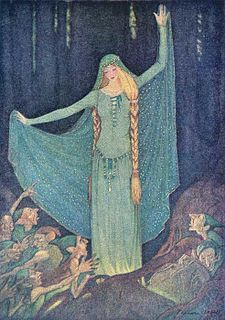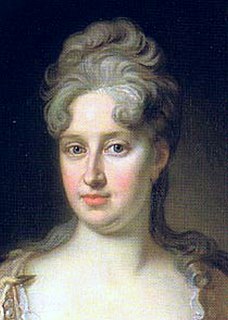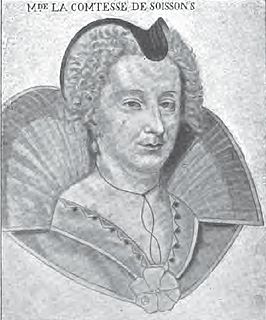Synopsis
A great lord was so cruel to his peasants that they called him Burchard the Wolf. His wife was kind and generous, and would secretly do good for those whom her husband wronged.
One day Burchard saw a peasant woman named Renelde. He told her if she came to the castle, he would make her the countess's lady-maid. She refused because she had to look after her grandmother, and was betrothed to a huntsman named Guilbert. He returned again, offering to make her a lady-in-waiting, and then to dismiss the countess and marry her. The last offer would not have moved her even if she had wanted to be the countess, because the countess had helped her when her grandmother was ill.
Some time later, he saw her spinning flax, and asked what she was about. She told him she was making her wedding shift, as she was to be married, if he gave his leave. He told her that she must spin nettles instead, to make her shift and his shroud, because she would not marry until he was laid in his grave. Guilbert offered to kill the count. Renelde refused because it would be murder, and besides, the countess had been kind to her. Her grandmother suggested that she try spinning the nettles.
She found she could make good thread of them, and when Burchard came by again, she showed him her shift. She began on the shroud, and Burchard felt ill that evening. He sent soldiers to throw her into the river, but she struggled to shore and went on spinning. When they tried to tie a stone to her neck, it untied itself, and she made to shore. The Count had himself carried to the cottage—he was too ill to walk—and tried to shoot her, but the bullet rebounded harmlessly. He broke the spinning wheel, but it was repaired the next day. He had her tied and set guards, but the guards fell asleep and the bonds untied themselves. He had every nettle uprooted, but they instantly sprouted again, even in her cottage. Every day the Count grew worse, and the Countess found out why. She asked Renelde to stop, and she did.
The count recovered but still refused Renelde permission to marry Guilbert. After a year, Guilbert left. Another year went by, and Burchard fell ill again, though Renelde had not started spinning again. He grew worse and worse and longed for death, but could not die. Then he realized that his shroud was not ready. He sent word to Renelde to prepare it. His pains grew less as she spun, wove, and sewed. When she took the last stitch he died.
Soon after this, Guilbert returned. He still loved Renelde and married her.

In mythology, folklore and speculative fiction, shapeshifting is the ability to physically transform oneself through an inherently superhuman ability, divine intervention, demonic manipulation, sorcery, spells or having inherited the ability. The idea of shapeshifting is in the oldest forms of totemism and shamanism, as well as the oldest existent literature and epic poems such as the Epic of Gilgamesh and the Iliad. The concept remains a common literary device in modern fantasy, children's literature and popular culture.

Lady Mary Victoria Douglas-Hamilton, also known as Mary Victoria Hamilton, was a Scottish noblewoman who was the great-grandmother of Prince Rainier III of Monaco, Prince Karl Johannes von Schwarzenberg and Princess Ira von Fürstenberg, and the great-great grandmother of Albert II, Prince of Monaco.

Mention of textiles in folklore is ancient, and its lost mythic lore probably accompanied the early spread of this art. Textiles have also been associated in several cultures with spiders in mythology.

The Marriage of Figaro is a comedy in five acts, written in 1778 by Pierre Beaumarchais. This play is the second in the Figaro trilogy, preceded by The Barber of Seville and followed by The Guilty Mother.
The Queen of Spades is a 1982 film adaptation of the 1834 Alexander Pushkin short story of the same name.

"The Three Spinners" is a German fairy tale collected by the Brothers Grimm in Grimm's Fairy Tales. It is Aarne–Thompson type 501, which is widespread throughout Europe.
"The Witch" is a Russian fairy tale. Andrew Lang included it in The Yellow Fairy Book. A version of the tale, under the title "The Twins and the Snarling Witch", appears in A Book of Witches by Ruth Manning-Sanders.

Jack Harcourt Deveraux and Jennifer Rose Horton are fictional characters and a supercouple from the NBC daytime drama Days of Our Lives, whose history spans from 1989 until 2012. The two have been portrayed by more than one actor/actress since their inception, but were originally, most recently, and most famously portrayed by Matthew Ashford and Melissa Reeves. Fans have nicknamed the couple "J&J" or JnJ" on internet message boards. For their portrayal of Jack and Jennifer's romance, Ashford and Reeves won Soap Opera Digest Awards for Favorite Supercouple in 1991 and Best Love Story in 1992.

Margaret of Nevers, also known as Margaret of Burgundy, was Dauphine of France and Duchess of Guyenne as the daughter-in-law of King Charles VI of France. A pawn in the dynastic struggles between her family and in-laws during the Hundred Years' War, Margaret was regarded as the future Queen of France at two separate times, as a result of her two marriages: first to the Dauphin and second to the Duke of Brittany.
The Enchanted Snake or The Snake is an Italian fairy tale. Giambattista Basile wrote a variant in the Pentamerone. Andrew Lang drew upon this variant, for inclusion in The Green Fairy Book.

Scott Anderson is a fictional character from the British Channel 4 soap opera Hollyoaks, played by Daniel Hyde.
"The Griffin" is a German fairy tale collected by the Brothers Grimm in Grimm's Fairy Tales.

"The Two Kings' Children" is a German fairy tale collected by the Brothers Grimm in Grimm's Fairy Tales, tale number 113.
The Princess in the Chest, also known as The Princess in the Coffin is a Danish fairy tale. Andrew Lang included it in The Pink Fairy Book.
"The Queen of Spades" is a short story with supernatural elements by Alexander Pushkin about human avarice. Pushkin wrote the story in autumn 1833 in Boldino, and it was first published in the literary magazine Biblioteka dlya chteniya in March 1834.

Sophia Louise of Mecklenburg-Schwerin was Queen consort in Prussia by marriage to King Frederick I of Prussia. She was famed for her beauty.

Princess Hélène of Orléans was a member of the deposed Orléans royal family of France and, by marriage to the head of a cadet branch of the Italian royal family, the Duchess of Aosta. Although her hand in marriage was sought for the heirs to the thrones of both the United Kingdom and the Russian Empire, neither alliance materialized.

Anne de Montafié, Countess of Clermont-en-Beauvaisis, was a French heiress and the wife of Charles de Bourbon, Count of Soissons, a Prince of the Blood, and military commander during the French Wars of Religion. Following her marriage in 1601, she was styled Countess of Soissons. She was the Countess of Clermont-en-Beauvaisis, Countess of Montafié, Lady of Lucé and Bonnétable in her own right.
Elisa di Rivombrosa is an Italian television series about a love story in 18th century Italy between Fabrizio Ristori, a young Italian Count, and his mother's maid, Elisa. It was broadcast on Mediaset for two seasons from 2003 to 2005:
This page is based on this
Wikipedia article Text is available under the
CC BY-SA 4.0 license; additional terms may apply.
Images, videos and audio are available under their respective licenses.











